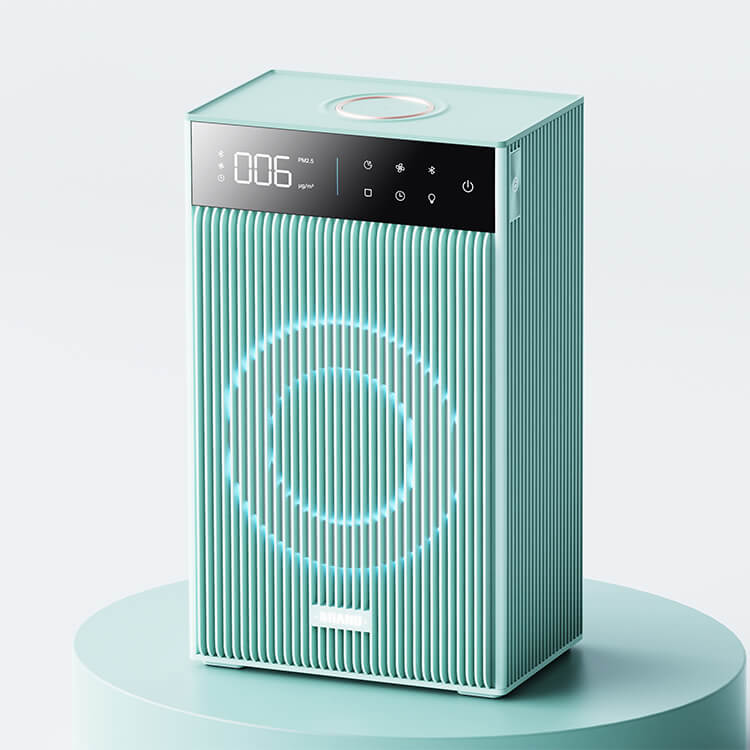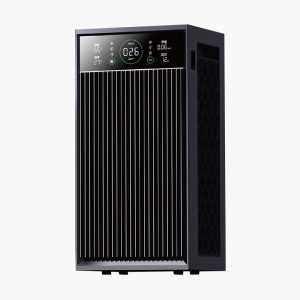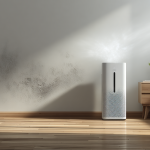Different Health Effects of Poor Air Quality Air quality is an important predictor of human health and wellbeing. Therefore, it is important to monitor and understand air quality and take the necessary steps to ensure healthy air for everyone. To effectively monitor air quality, the Air Quality Index (AQI) is used to measure the concentrations of pollutants in the air and rate it on a scale based on these concentrations. In this article, we will look at what the AQI is, how it is measured, the effects of poor air quality on human health, the role of an air purifier in mitigating poor air quality, recommended practices for choosing the right air purifier, and finally, a conclusion.

What Is an Air Quality Index and How Is It Measured?
The Air Quality Index (AQI) is a numerical index used for reporting daily air quality based on measurements from an air quality sensor. The higher the AQI value is, the greater the level of air pollution might be a concern. The AQI value is obtained by averaging air quality readings from various air quality sensors. High AQI values can therefore indicate the presence of pollutants in the air, such as carbon monoxide, ozone, nitrogen dioxide, sulfur dioxide, and particulate matter, which can have adverse effects on human health. Knowing the AQI value can help determine what associated health effects may be of concern for you.
How Is It Measured?
The Air Quality Index is measured using air quality sensors that are outfitted with sensors to measure different pollutants in the air. Some air quality sensors use lasers to scan the particulate matter density in a cubic metre of air, while others rely on satellite imaging. The AQI is calculated by converting the concentrations of various pollutants that are measured using these sensors into a uniform index. This allows for a clear comparison between different pollutants and the resulting AQI value.
Effects of Poor Air Quality on Human Health
Poor air quality can have both short-term and long-term effects on human health. Short-term health complications include headaches, dizziness, nausea, and irritation to the nose, throat, eyes, and skin, as well as increased risk for conditions such as pneumonia and bronchitis. Long-term health effects include stroke, ischaemic heart disease, chronic obstructive pulmonary disease (COPD) and lung cancer. People with existing health conditions such as asthma are particularly at risk for the short-term and long-term health effects of poor air quality.

The Role of an Air Purifier in Mitigating Poor Air Quality
An air purifier can be an effective way to improve air quality in your home or office. Air purifiers activate filters in order to reduce pollutant levels in the air. These filters capture particles in the air, such as dust and pollen, to reduce particles that can irritate the respiratory system or aggravate asthma or allergies. Air purifiers can also reduce the levels of volatile organic compounds (VOCs) and ozone, both of which can be health hazards when present at an elevated level in the air. Air Filter Manufacture can reduce the effects of poor air quality on your health and breathe easier.
What are Air Purifiers?
An air purifier is a device that removes contaminants from the air in a room. Air purifiers come in a variety of designs, shapes, and sizes and work by pulling air into the device and filtering it through various filters to remove particles such as dust, pollen, mold, bacteria, and viruses. Some air purifiers also include ionizers, which emit charged particles that attach to contaminants in the air, making them heavier and causing them to drift down to the filter. By using an air purifier, it is possible to improve air quality and reduce the risks associated with poor air quality.

Different Types of Air Purifiers
There are several different types of air purifiers available on the market today, such as ultraviolet air purifiers, HEPA air purifiers, activated carbon air purifiers, ionic air purifiers, electronic air cleaners, central air cleaners, and air-to-air exchangers. Each type of air purifier works in a different way to clean the air. For example, HEPA air purifiers use a fine mesh of fibers to trap particulates in the air, while ionic air purifiers emit charged particles to capture pollutants in the air. Let’s check how HEPA air purifiers can improve indoor air quality by capturing airborne particles and reducing contaminants. Depending on your needs, there is likely an air purifier that can help you reduce air pollution and improve the air quality in your home.
Recommended Practices for Choosing the Right Air Purifier
When choosing the right air purifier for your needs, there are several recommended practices to follow. First, you should consider the size of the room you wish to place the air purifier in. An air purifier should be powerful enough to purify air in the entire room; otherwise, it might not be effective. Second, compare the clean air delivery rate (CADR) ratings of different air purifiers to get an idea of the efficiency of each one. Third, look for air purifiers that use HEPA filters, which are designed to capture particles as small as 0.3 microns, and are the most effective at filtering air. Finally, you should also check the noise levels of different air purifiers as some air purifiers can be quite loud. Highly recommend this Large Room Air Purifier For Home Office Hotel CADR2000. It’s a powerful air purifier that can quickly and effectively clean the air, eliminating odors and allergens for a healthier living environment. Its CADR2000 rating provides excellent performance that ensures improved air quality in large sized room.
Conclusion
In conclusion, air quality is an important factor for human health and should not be overlooked. The Air Quality Index (AQI) can be used to measure the concentrations of pollutants in the air and rate it on a scale based on these concentrations. Poor air quality can have both short-term and long-term effects on human health. An air purifier can be an effective way to reduce the effects of poor air quality and improve air quality in your home or office. By following recommended practices for choosing the right air purifier, you can ensure that you are breathing the cleanest air possible.



